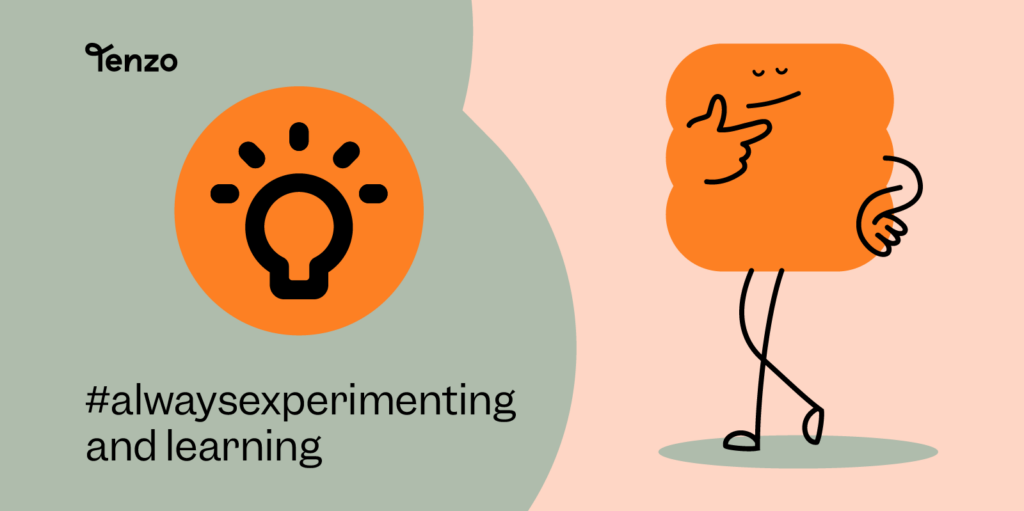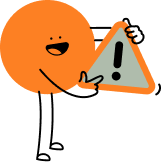In this article
Part of our company-wide goals for 2021 is actively promoting and living our core values. To hold ourselves accountable and make sure the entire team gets involved, we’ve instituted squads for all of our values. Here, the leader of our first value squad, Dr Matt Brewer, Senior Software Developer at Tenzo, breaks down how we’re approaching this initiative and what’s on the cards for our first value: ‘Always experimenting and learning’.
When we renewed our values at the beginning of 2020, we thought that upholding them would be simple – we saw each other every day, we’d be able to encourage and steer each other in the right direction. But then of course the pandemic hit and we quickly realised that upholding our values when we were all at home and spread across the world would not be as simple as we thought.
As a response to this, we decided to set up ‘squads’ for each value with nominated leaders. These value squads would be responsible for a) critically assessing how we live each value today and b) producing initiatives and targets for the whole team on how we can improve. These squads are also responsible for holding everyone accountable on the targets set.
Since these squads are a new initiative and we’re still experimenting with how they will practically work and integrate with our team’s processes, it seemed like a good idea to start with the ‘Always Experimenting and Learning’ value. This is a value close to my own heart given I come from a research science background and this value was core to the ethos of myself and those I worked with back then.

Getting the lay of the land
Our first task was to take an in-depth look at how we are currently living this value, asking ourselves whether everyone feels they have the opportunity to learn and experiment in their roles, how many experiments are being done, and how we are communicating the results if so.
The main themes emerging from this research were around knowledge-sharing and lowering opportunity costs for more blue sky experimentation. The Tenzo team is a collection of highly intelligent people; where we are lacking is when it comes to sharing that knowledge with one another.
This ‘knowledge-sharing’ is particularly important as we know it can lead to inefficiencies when a member of the team can’t find resources from previous research for a specific task or if they repeat research already carried out by another colleague. Additionally, it can make it harder for new-starts to get up to speed without well-defined source material to use as a first port of call.
The second area we highlighted that could be improved is that we don’t have a process when it comes to conducting research or experiments. I think back to my school days where you would be forced to write exactly how you came up with a result: Introduction, Hypothesis, Methods, Results, and Discussion.
It’s not that we need to be as formal as say, a scientific paper would, but more so to make it clear what we did, why, and what the outcomes were, so that we aren’t repeating anything.
Initiatives
After looking at how we’re currently living our ‘Experimenting & Learning’ value, we came up with several straightforward goals and initiatives to help us better connect with this value. The first step is simple, we are encouraging the team to jot down any research or experiments they plan to (and do) conduct, be it bullet points or an in-depth presentation.
The idea here is that simply writing out what you plan to do often gives us more clarity and can lead us to the answer more quickly than if we don’t set out a plan. In order to keep a record of every bit of research anyone has done we are creating one location to put these reports so they can be referred to later if someone else has a similar idea or is looking for inspiration for new ones.
Growth
Some of the targets we are setting are specific for our two different teams: Growth and Product. For our Growth team we are setting the goal of conducting a set number of experiments within the first half of 2021. This could include A/B testing on the website, tracking best performing landing pages and advertising, sales funnel experimentation, hiring processes and more.

Photo by Scott Graham on Unsplash
To keep a record of this progress we have created an experiment tracker to lower the opportunity cost and allow the team to feel that they can experiment in their role by incorporating it into their daily work. It also gives the team a base to see all the different experiments the various departments are conducting.
Product
Same as on the Growth team, we are encouraging everyone on the Product team to report what they’re experimenting with or researching. Since developers make up the majority of this team micro-experimentation happens on a daily basis as part of solving problems. The focus here is more on the higher level topics where there may be several different solutions and create a more formal process of decision making.
An important part of deciding where experimentation is needed is gathering empirical data to inform us what we could try and to track the success, or failures, of any resulting experiments. For example, we are striving to increase our speed when it comes to deployments. There are many things that impact this, such as build time and frequency, and time reviewing, updating and merging proposed changes. These are all measurable variables and if we want to devise experiments to reduce them, we first need to know what the averages of each of these metrics are.
Learning

Photo by Jude Beck on Unsplash
To increase knowledge-sharing within our team as a whole we are putting a few new initiatives in place. Firstly, we are dedicating time each month for everyone to set aside to learn something. We left this purposefully vague to allow research into areas we might not normally venture. The important thing is that people report back anything insightful they have learnt, in the form a short document or a presentation if it’s worth discussing or debating.
Secondly, somewhat tying into the previous point, is that we are organising ‘Show & Tell’ sessions for people to present a topic of their choice to either their main team or to other departments if relevant. These sessions are also there to encourage discussion and debate within the teams to help keep the creative juices flowing.
Lastly unifying all this knowledge in a central location is essential for anyone to be able to see and read what others have been doing. There’s not much point having an unlinked document floating somewhere in the ether of the cloud. To resolve this, we are sprucing up our internal site (intranet) to have everything correctly grouped together and also, like a dictionary, indexed where you can simply search through a list of all the documents/ presentations/ memos/ meeting notes etc. to find what you’re looking for.
In this, our first major experiment, we’re hoping these relatively small changes will be reflected in our team’s overall ability to move faster, have more freedom to learn, try and fail, boost our creativity, and most importantly, learn new things. Our squad will certainly be tracking the progress of each initiative. It is likely that not all the initiatives will succeed, or turn out in the way we’re anticipating at least, but the point is that we will learn something irrespective of the outcomes.
Find out more about how we reshaped our values to better represent the team in the first blog of this series.
Cover Photo by Lysander Yuen on Unsplash





